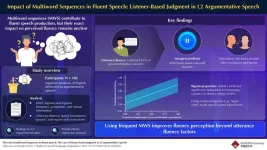(Press-News.org) There are over six million Americans with heart failure who are at greater risk of losing their cognitive abilities earlier in life, a study suggests.
The research team, led by Michigan Medicine, examined the cognitive abilities of nearly 30,000 adults over time, comparing those who did and did not develop heart failure.
The researchers found heart failure is associated with a significant decrease in cognition at the time of diagnosis.
Global cognition and executive functioning also declined more rapidly over the years after heart failure diagnosis, as people with the condition mentally aged the equivalent of 10 years within just seven years of a heart failure diagnosis.
The results are published in Circulation: Heart Failure.
“Heart failure is a disease that never goes away and treating it relies heavily on a patient’s ability to follow specific instructions, monitor their symptoms and keep up with many different medications,” said Supriya Shore, MBBS, MSCS, first author and clinical assistant professor of internal medicine-cardiology at University of Michigan Medical School.
“Seeing this cognitive decline among patients, and how it worsens over time after a diagnosis of heart failure, should be a warning for providers to assess a patient’s cognitive ability early and factor it into the care plan.”
Typical risk factors for cognitive impairment, such as high blood pressure and heart attack, did not explain the accelerated decline observed in the participants with heart failure, according to the study.
The largest decrease in global cognition — a composite of several features of cognitive ability, including attention and problem solving — occurred among older adults, women, and white participants.
Investigators say, based on their findings, that adults with heart failure would reach the threshold for meaningful decline in global cognition nearly six years earlier than people without it.
Executive functioning would diminish around four-and-a-half years earlier.
“Regular cognitive monitoring of older adults with heart failure would help identify individuals with the earliest signs of cognitive decline who require supportive care,” said senior author Deborah A. Levine, M.D., M.P.H., professor of internal medicine and neurology at U-M Medical School.
“We need a better understanding of the mechanisms driving accelerated cognitive decline after heart failure to develop interventions that halt or slow the decline.”
Decisions about treatment, Shore says, are complex and highly dependent on cognitive capacity.
These findings likely also explain the results of a 2024 qualitative study led by Shore which found that most patients with heart failure displayed a poor understanding of their prognosis.
Caregivers, on the other hand, commonly identified when a patient was declining in health.
Some participants said their physicians avoided these conversations, while others said they were confused by the provider’s medical jargon.
“Most people with heart failure, as well as their care partners, want discussions around prognosis to begin early in the course of the disease and to be repeated routinely using patient-centered language,” Shore said.
“They want to speak candidly about quality of life and survival assessments. Even though these conversations are tough, people want to have it. With what we know about the rate of cognitive decline in this patient population, there is a major need to meet patients where they are with clarity and compassion to improve overall care in heart failure.”
Additional authors: Hanyu Li, M.S., Min Zhang, Ph.D., Rachael Whitney, Ph.D., Brahmajee K. Nallamothu, M.D., M.P.H., Bruno Giordani, Ph.D., Emily M. Briceño, Ph.D., Jeremy B. Sussman, M.D., M.S., all of University of Michigan. See remaining authors online.
Funding/disclosures: This research project is supported by the National Institute of Neurological Disorders and Stroke (R01NS102715) of the National Institutes of Health. The NINDS was not involved in the design and conduct of the study; collection, management, analysis, and interpretation of the data; preparation, review, or approval of the manuscript; or decision to submit the manuscript for publication, except that 1 representative (author R.F.G.) of the funding agency reviewed the manuscript. The content is solely the responsibility of the authors and does not necessarily represent the official views of the NINDS or the NIH. Additional funding was provided to Shore by the American Heart Association (grant ID 855105) and to Levine by the National Institute of Aging (R01AG051827, RF1AG068410)
Paper cited: “Trajectory of Cognitive Function After Incident Heart Failure,” Circulation: Heart Failure. DOI: 10.1161/CIRCHEARTFAILURE.124.011837
END
Cognitive decline comes sooner for people with heart failure
Management of heart failure is complex and requires strict adherence to instructions, medications and care coordination
2025-04-03
ELSE PRESS RELEASES FROM THIS DATE:
SMEs’ ability to innovate is strongly tied to the learning and decision-making skills of managers
2025-04-03
The ways in which CEOs learn, apply what they have learned, and make decisions are significant to the innovating capabilities of SMEs, states Jutta Mäkipelkola in her doctoral dissertation at the University of Vaasa, Finland. Her research reveals how the skills of CEOs shape the capabilities of SMEs – and what kind of organisational culture drives innovation.
The importance of capabilities that enhance the innovativeness and renewal of companies has become more apparent during uncertain ...
Researchers recycle wind turbine blade materials to make improved plastics
2025-04-03
PULLMAN, Wash. – A new method to recycle wind turbine blades without using harsh chemicals resulted in the recovery of high-strength glass fibers and resins that allowed Washington State University researchers to re-purpose the materials to create stronger plastics.
The innovation provides a simple and environmentally friendly way to recycle wind turbine blades to create useful products.
Reporting in the journal, Resource, Conservation, and Recycling, the team of researchers cut the lightweight material that is commonly used in wind turbine blades, called glass fiber-reinforced polymer (GFRP), into approximately two ...
Low neighborhood walkability is associated with increased risk of cardiovascular disease
2025-04-03
Milan, Italy – 3 April 2025. Low neighbourhood walkability is associated with increased risk of cardiovascular disease (CVD), according to research presented today at ESC Preventive Cardiology 2025,1 a scientific congress of the European Society of Cardiology (ESC).
The health benefits of physical activity are well established and yet more than a quarter of adults do not meet the recommended guideline of 150 minutes of moderate-intensity physical activity per week.2 “Neighbourhoods designed ...
Common phrases, not fancy words, make you sound more fluent in a foreign language
2025-04-03
Language learners often assume that using rare, complex vocabulary will make their speech sound more fluent. Research suggests that there is a close relationship between formulaic expression usage in speech and acoustic features of oral fluency. This implies that using formulaic expressions leads to faster articulation speed and fewer disruptions during speech. However, in terms of how listeners perceive speakers’ fluency, the role of formulaic expressions has been unclear.
To investigate this, Ph.D. student, Kotaro Takizawa and Research Assistant Professor Shungo Suzuki from Waseda University, Japan, analyzed speech from 102 Japanese speakers ...
Printed skin to replace animal testing
2025-04-03
Directive 2010/63/EU laid down restrictions on animal testing for the testing of cosmetics and their ingredients throughout the EU. Therefore, there is an intense search for alternatives to test the absorption and toxicity of nanoparticles from cosmetics such as sun creams. A team of researchers from Graz University of Technology (TU Graz) and the Vellore Institute of Technology (VIT) in India is working on the development of skin imitations that mimic the native three-layer tissue structure and biomechanics of human skin. Such imitations can be produced ...
Precision medicine could be possible in the fight against antibiotic resistance
2025-04-03
The first-of-its-kind in-depth bacterial evolutionary map could pave the way for the development of precision treatments for certain antibiotic-resistant infections, such as urinary tract infections.
Researchers at the Wellcome Sanger Institute, the University of Oslo, UiT The Arctic University of Norway, and their collaborators, have developed a new way of using large-scale long-read sequencing data to investigate circular genetic structures called plasmids in the most commonly studied microbe, Escherichia coli (E. coli). Through this, the team were able to track the flow ...
Researchers at the Lewis Katz School of Medicine at Temple University identify new targeted approach to protect neurons against degeneration
2025-04-03
(Philadelphia, PA) – Neurodegenerative conditions such as Parkinson’s disease and Alzheimer’s involve progressive neuronal loss due to disease-induced damage. An enzyme known as dual leucine-zipper kinase (DLK) plays a key role in this process, telling neurons that are damaged or unhealthy when they should cut their losses and self-destruct. Hence, sparing neurons from DLK is an attractive therapeutic strategy that could slow disease progression.
Past attempts to inhibit DLK’s action in human patients, however, led to unexpected side effects affecting the nervous system, suggesting that DLK ...
Western diet causes inflammation, traditional African food protects
2025-04-03
A switch of just two weeks from a traditional African diet to a Western diet causes inflammation, reduces the immune response to pathogens, and activates processes associated with lifestyle diseases. Conversely, an African diet rich in vegetables, fiber, and fermented foods has positive effects. This study, published in Nature Medicine, highlights the significant impact of diet on the immune system and metabolism.
Lifestyle diseases such as cardiovascular diseases, diabetes, and chronic inflammatory conditions are surging across Africa, posing a growing challenge to healthcare systems throughout the continent. Increasing economic ...
Electrochemical method supports nitrogen circular economy
2025-04-03
By Shawn Ballard
Imagine a world where industrial waste isn’t just reduced, it’s turned into something useful. This kind of circular economy is already in the works for carbon. Now, researchers in energy, environmental & chemical engineering at Washington University in St. Louis have developed a promising pathway to convert harmful nitric oxide, a key component of acid rain, into valuable nitric acid, which is used in everyday applications from fertilizer production to metal processing.
Feng Jiao, the Lauren and Lee Fixel Distinguished Professor in the McKelvey School of Engineering at WashU, and collaborators developed a method ...
How researchers are shining a light on kidney disease
2025-04-03
For patients with polycystic kidney disease (PKD), a common genetic disorder that ravages the waste-removing organ with cysts, dialysis and transplantation are among the only treatments.
More than 12.4 million people worldwide suffer from the dominant form of the condition. Now, Rutgers University geneticists have uncovered fresh details of how the disease progresses – findings that could open the door to new therapies.
In a study published in Nature Communications, Inna Nikonorova, a research assistant professor in the Department of Genetics within the Rutgers School of Arts and Sciences, reports on a novel way to identify and track material carried ...
LAST 30 PRESS RELEASES:
Spiritual practices strongly associated with reduced risk for hazardous alcohol and drug use
Novel vaccine protects against C. diff disease and recurrence
An “electrical” circadian clock balances growth between shoots and roots
Largest study of rare skin cancer in Mexican patients shows its more complex than previously thought
Colonists dredged away Sydney’s natural oyster reefs. Now science knows how best to restore them.
Joint and independent associations of gestational diabetes and depression with childhood obesity
Spirituality and harmful or hazardous alcohol and other drug use
New plastic material could solve energy storage challenge, researchers report
Mapping protein production in brain cells yields new insights for brain disease
Exposing a hidden anchor for HIV replication
Can Europe be climate-neutral by 2050? New monitor tracks the pace of the energy transition
Major heart attack study reveals ‘survival paradox’: Frail men at higher risk of death than women despite better treatment
Medicare patients get different stroke care depending on plan, analysis reveals
Polyploidy-induced senescence may drive aging, tissue repair, and cancer risk
Study shows that treating patients with lifestyle medicine may help reduce clinician burnout
Experimental and numerical framework for acoustic streaming prediction in mid-air phased arrays
Ancestral motif enables broad DNA binding by NIN, a master regulator of rhizobial symbiosis
Macrophage immune cells need constant reminders to retain memories of prior infections
Ultra-endurance running may accelerate aging and breakdown of red blood cells
Ancient mind-body practice proven to lower blood pressure in clinical trial
SwRI to create advanced Product Lifecycle Management system for the Air Force
Natural selection operates on multiple levels, comprehensive review of scientific studies shows
Developing a national research program on liquid metals for fusion
AI-powered ECG could help guide lifelong heart monitoring for patients with repaired tetralogy of fallot
Global shark bites return to average in 2025, with a smaller proportion in the United States
Millions are unaware of heart risks that don’t start in the heart
What freezing plants in blocks of ice can tell us about the future of Svalbard’s plant communities
A new vascularized tissueoid-on-a-chip model for liver regeneration and transplant rejection
Augmented reality menus may help restaurants attract more customers, improve brand perceptions
Power grids to epidemics: study shows small patterns trigger systemic failures
[Press-News.org] Cognitive decline comes sooner for people with heart failureManagement of heart failure is complex and requires strict adherence to instructions, medications and care coordination



